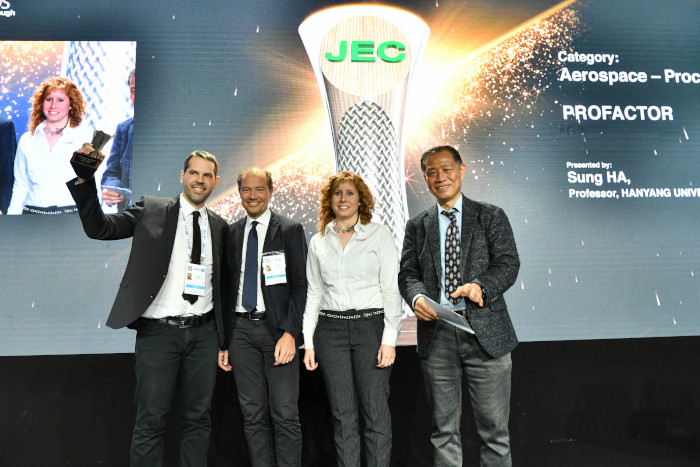The JEC Innovation Awards reward composites champions, based on criteria such as partner involvement in the value chain, technicality or commercial applications of innovations. The JEC in Paris is the world’s largest composites exhibition. Ten composite innovation champions selected among 30 finalists, from more than a hundred entries, were awarded
The project ZAero coordinated by PROFACTOR won the JEC innovation award in the category aerospace processes.
The project consortium developed technologies for zero defect manufacturing of large composite parts.

Zero-defect manufacturing of composite parts
In the aerospace industry, very large components (e.g. wing covers) are made of carbon fiber composite materials. Different challenges are related to the processing of such materials. The complexity that comes with carbon fiber composites often leads to anomalies and defects during production. The EU project ZAero developed intelligent inspection technology to detect problems in production at an early stage. The ZAero project aims for 30-50% boost in productivity via inline AFP and ADMP inspection, simulated part performance and decision support tools. The technology will be showcased at the JEC (Hall 5, Booth S66).
Very high quality standards have to be met in the aerospace industry. In order to guarantee production of defect-free components, a great deal of effort needs to be put into quality control. Lightweight carbon fiber reinforced plastics (CFRP) components are nowadays largely used in the aerospace industry. Production of such parts requires multiple stages of processing, each of which needs to be done with great care.
Continuous process monitoring for zero defects
In order to avoid defects during production, the EU project ZAero developed technologies for consistent monitoring of production. This is based on sensors for fiber orientation measurement and 3D profile scanning that perform inline monitoring during the lay-up process. In addition to this, data from the following production stages (infusion, curing) is collected in a manufacturing database. This database represents a “digital twin” of the real part as manufactured. Intelligent data processing and mechanical simulation provide information about the severity of defects.Logistical simulation delivers information about the part flow and overall production performance. This enables a global view on the production and reveals how defect rates and re-work decisions affect, for example, completion time of a specific order.
Industrial reference implementation
Installation of monitoring systems into industrial environments were done at the facilities of Danobat and FIDAMC. The deployed sensor systems were demonstrated to work well in the respective environments. Data collection, simulation, and decision support modules were successfully demonstrated. Experiments showed that the future production of up to 60 passenger planes per month will be possible with the technologies developed within the project.
PROFACTOR is an Austrian research company located in Steyr and focuses on developing new methods for integrated production technologies. In the field of composite part production, the technological focus is on zero defect manufacturing. PROFACTOR offers sensor systems for fibre orientation measurements, AFP and ADMP monitoring, surface inspection and thermography. Visit us at booth S66 in hall 5.
ZAero Zero-defect manufacturing of composite parts in the aerospace industry
Coordinator PROFACTOR GmbH
Partners: Airbus Defence and Space GmbH, Dassault Systèmes SE, M Torres Diseños Industriales SA, IK4 – IDEKO S Coop, Danobat S Coop, FIDAMC
Duration: 2016 – 2019
Funding: EU Horizon 2020
Website: www.zaero-project.eu
 This project has received funding from the European Union’s Horizon 2020 research and innovation programme under grant agreement No 721362.
This project has received funding from the European Union’s Horizon 2020 research and innovation programme under grant agreement No 721362.

